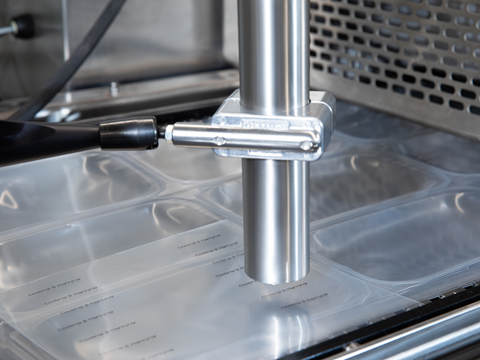
SÜDPACK and LEIBINGER have tested the suitability of continuous inkjet (CIJ) inks for printing on recyclable films for foods sterilized after being packaged, with a combined packaging and printing solution expected to save food manufacturers time and ensure investment security.
By 2030, the EU Packaging Regulation will require all packaging sold on the EU market to be recyclable, which has driven an uptake in mono-material solutions. LEIBINGER explains that, without a barrier function preventing inks from contaminating products in food packaging applications, a manufacturer’s choice of inks is limited; this could impact the production, coding, and marking of packaging films.
In response, SÜDPACK seeks to keep developing its recyclable film portfolio, setting its sights on increased protection and convenience; while LEIBINGER and LEIBINGER Group company SIS Ink Solution provide industrial and CIJ inks to print and code food packaging films.
Now the companies have combined their offerings to gauge the suitability of using CIJ inks to print on, and then sterilize, recyclable food packaging. At SÜDPACK’s technical centre, they printed mono-PE and mono-PP films with advanced CIJ ink – said to only contain raw materials approved in line with the German Printing Inks Ordinance and the Swiss Commodities Ordinance.
Then, during steam sterilization, the film samples were heated at 121°C for 30 minutes. Reportedly, the print was still legible on the samples after testing; this suggests that the inks are suitable for printing on food-contact materials.
“The sterilization resistance of ink is always a major challenge,” says Dr Thomas Paul, ink expert and managing director at SIS Ink Solution. “I am delighted that we have succeeded in developing a food-approved CIJ ink that is this effective when printing on mono-materials.”
Interested parties can view a live demonstration of the printing process and learn more about LEIBINGER and SÜDPACK’s collaboration by visiting Booth 7-550 in Hall 7 at this year’s FACHPACK.
A similar project saw Wageningen University & Research work with eleven industrial partners to investigate the safety of recycled PE and PP film for use in food contact applications. Combined with the infrastructure for analysis and identification of contaminants, the data generated is expected to help industrial parties evaluate the suitability and performance of recycled materials.
Linx Printing Technologies has also developed two new inks to print legible, durable codes onto the ‘latest generation’ of recycled and recyclable plastic films. They are designed to provide reliable code adhesion on plastic film packaging, including plastic flow wrap for dry foods and plastic pouches for food sauces, confectionery, pet foods and household chemicals.
In another project, SÜDPACK worked with SN Maschinenbau to develop a recyclable film solution for stand-up pouches with spouts. The polypropylene-based packs are said to be reclosable and can be individually equipped with barriers against water vapour, oxygen or UV light – making them suitable for liquid or pasty food like fruit purees.
If you liked this story, you might also enjoy:
The ultimate guide to the Packaging and Packaging Waste Regulation in 2024
How are the top brands progressing on packaging sustainability?
Sustainable Innovation Report 2024: Current trends and future priorities
Everything you need to know about global plastic sustainability regulation














No comments yet